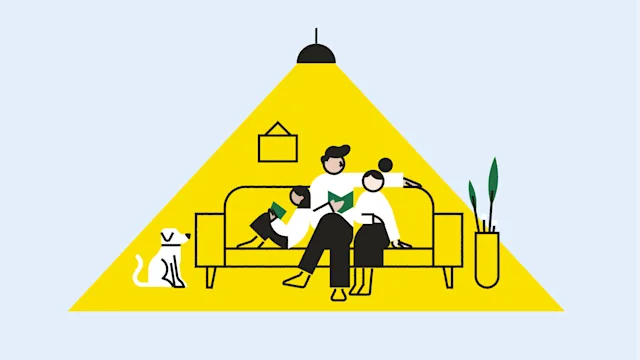Key takeaways:
Physical abuse by male partners is very common. But this doesn’t mean it’s normal. It’s never okay for your boyfriend to hit you — not even once.
Abuse from an intimate partner can come in many different forms. And since it tends to escalate, it’s important to get help at the earliest sign of a problem.
If you need immediate help, call the National Domestic Violence Hotline at 1-800-799-7233 or text “SAFE” to 88788
Intimate relationships are complicated. Love is a strong emotion that can make you feel the happiest you’ve ever been. It can also make you feel sad or confused at times. All people experience the ups and downs that come with sexual intimacy. But those “downs” should never include violence of any kind.
Intimate partner violence affects people of all genders and sexual preferences. This includes people who are in a heterosexual or homosexual relationship. It also includes those with a trans or nonbinary partner, or anyone in a polyamorous or open relationship. Here’s what to do if your boyfriend or male-identifying partner is acting violent in your relationship.
Quiz: Is my relationship toxic?
What are signs of an abusive relationship?
Abuse comes in many different forms. While physical abuse often gets the most attention, emotional abuse — sometimes referred to as psychological abuse — is also very common. All types of abuse are harmful.
What does physical abuse look like?
Physical abuse is often referred to as domestic violence. It includes:
Hitting
Pushing
Pouring hot liquid on someone
Throwing objects
Using any type of weapon, or any object as a weapon
Destroying property
Forced sexual acts
Choking
Spitting on someone
Grabbing hold of any part of the body
In a new relationship, it’s important to keep an eye out for “warning signs” that could indicate that your boyfriend may be abusive. Some warning signs may include extreme jealousy, making decisions for you, or exerting control over you.
Emotional abuse may also be a warning sign of the potential for physical abuse. It can occur before or alongside physical abuse.
What does emotional abuse look like?
Many people do not realize they are experiencing abuse, especially if it’s emotional abuse. This can be more subtle. And the emotional abuse can occur slowly over time.
Still, it can be really harmful. This kind of treatment can impact your self-esteem and mental health. And you may even start to feel like you deserve this type of treatment.
Read more like this
Explore these related articles, suggested for readers like you.
Emotional abuse may look like:
Putting you down or belittling you
Blaming you for everything
Taking out everyday frustrations on you
“Gaslighting,” or convincing you that the abuse isn’t real or is just “in your head”
Ignoring you or giving you the “silent treatment”
If emotional abuse escalates into hitting, or is accompanied by physical violence, you may also begin to believe that you deserve this too. It’s important to know that hitting, or abuse of any kind, isn’t normal. It’s never OK for your boyfriend or male partner to hit you.
How common is domestic abuse?
Many people in abusive relationships feel very alone. They often don’t tell anyone about the abuse because they feel ashamed, or they want to believe that everything is OK. But if you’re experiencing any type of abuse, it’s important to know that you’re not alone. In fact, domestic violence is very common.
Over 10 million people in the U.S. experience intimate partner violence each year:
Physical violence from an intimate partner impacts 1 in 3 women who are 18 years or older.
Transgender women are at an increased risk for intimate partner violence.
Female victims are highly likely to experience physical injuries that can be fatal.
Domestic violence is always serious. And should never be ignored.
Why does your boyfriend hit you?
There are some factors that may cause someone to be more likely to be abusive or violent. For example, they may have been the victims of abuse or neglect in childhood. Or they may have a mental health condition. Substance use disorders and a history of violence may make it more likely for your partner to be violent toward you.
Regardless of the reasons, it is important to know that it is not your fault when your boyfriend hits you. This is true even if you are made to feel like you are the cause of your boyfriend's abusive behaviors. Intimate partner violence is never OK.
Should you forgive your boyfriend if it only happened once?
If you are in a relationship and your boyfriend hits you for the first time, they may express remorse after hitting you. They may promise not to do it again. They may even buy you gifts after they have hit you. These things can make it understandably easy to believe that they will not act this way again.
But research has shown that when your boyfriend is abusive, they are more likely to be abusive again. It is also likely that the violence will occur more frequently — and become more severe over time.
This is why it is so important to get help after the first time you experience any type of violence.
What should you do when your boyfriend hits you?
If your boyfriend hits you, you are likely to feel a variety of emotions. You may feel:
Shock
Betrayal
Sadness
Anger
Panic
If you have experienced domestic violence — even once — it is important to create a safety plan. Your plan may include:
Identifying a safe place at home, which should be close to an exit
Keeping your phone nearby (and charged) at all times so you can call a loved one or the police
Familiarizing yourself with the SOS feature on your phone, so you can easily call for help
Removing, or locking up, any weapons in the house
Changing the locks if your partner does not live with you, but has a key to your home
You may feel that running away or calling for help will make your boyfriend angry and make things worse. But your safety — and life — may be at risk. Calling for help can prevent an abusive situation from escalating, and it may even save your life.
If you do not want to or cannot directly tell the police or loved ones about the abuse, another option is to get yourself to a public place. There are also nonverbal “silent signs” you can use to let people know you need help. Below is the universal distress symbol. Using this silent sign can be especially helpful if you are in public and need to get away.

How do you leave an abusive relationship?
If your boyfriend hits or abuses you, your immediate priority should be to get yourself to a place of safety. For many, this may feel like the easy part. The next step is to permanently end the relationship — which can be much harder.
It’s very difficult to leave an intimate relationship for many reasons. This may be especially true if:
You have been together for a long time
You have children together
You are financially dependent on your boyfriend
It may also feel scary to be alone. And abusive partners often make someone feel like they can’t “do any better.” And this is particularly difficult if you have experienced domestic violence in other relationships.
These doubts and worries can feel overwhelming. But remember that you are not alone. If possible, reach out to your loved ones for emotional and financial support. If you don’t have a strong social network, you can search for shelters that can help support you.
If you are scared of leaving your boyfriend due to potential violence or threats, you can also choose to file a restraining order. These prohibit them from being within 200 feet of your location at any time (note that the details can vary based on regional laws). And since this order is legally binding, it can be enforced by law enforcement if necessary.
The bottom line
Emotional or physical abuse in an intimate relationship is never safe. And even though it is common, it is never normal for your boyfriend to hit or abuse you. If you are experiencing abuse, reach out for help. It is never your fault. And your safety is more important than any relationship.
If you need immediate help, call the National Domestic Violence Hotline at 1-800-799-7233 or text “SAFE” to 88788.

Why trust our experts?


References
Clare, C. A., et al. (2021). Risk factors for male perpetration of intimate partner violence: A review. Aggression and Violent Behavior.
Healthdirect Australia. (2022). Domestic violence and abusive relationships.
Heron, R. L., et al. (2021). Barriers and facilitators of disclosing domestic violence to the healthcare service: A systematic review of qualitative research. Health & Social Care in the Community.
Huecker, M. R., et al. (2023). Domestic violence. StatPearls.
McFarlane, J., et al. (2004). Protection orders and intimate partner violence: An 18-month study of 150 Black, Hispanic, and white women. American Journal of Public Health.
Mele, M. (2009). The time course of repeat intimate partner violence. Journal of Family Violence.
National Coalition Against Domestic Violence. (2020). Domestic violence.
National Domestic Violence Hotline. (n.d.). Domestic violence statistics.
National Domestic Violence Hotline. (n.d.). Warning signs of abuse.
National Domestic Violence Hotline. (n.d.). What is gaslighting?
National Domestic Violence Hotline. (n.d.). Why people abuse.
National Domestic Violence Hotline. (2023). Domestic abuse and its impact on transgender and non-binary survivors.
Partnership Against Domestic Violence. (n.d.). Safety planning.


















